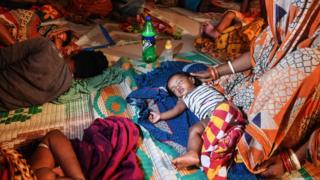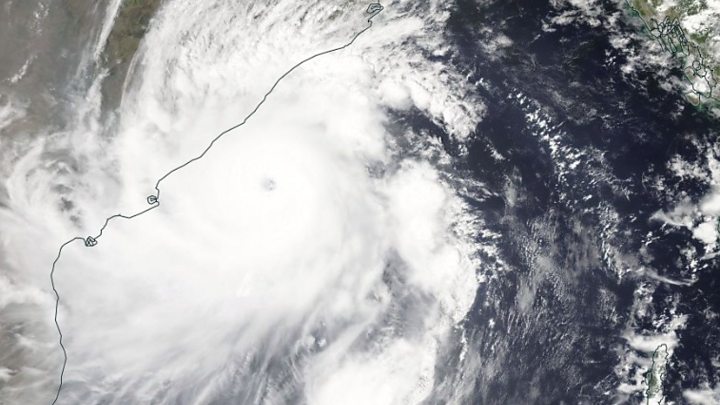 Image copyright
Image copyright
AFP
Thousands have already sought shelter in relief centres
Cyclone Fani is making landfall along India’s eastern coastline, according to the country’s Meteorological Department.
It is expected to reach wind speeds of 195 km/h (121 mph) when it strikes the coastline at full force in a few hours.
More than a million people have been evacuated from the eastern state of Orissa, also called Odisha, where the storm is expected to hit hardest.
Several neighbouring states have also been put on high alert.
The cyclone is expected to hit 15 districts in Orissa, including the tourist town of Puri, which is home to the 858-year-old Jagannath temple.
Numerous flights and train services in and out of the state have been cancelled, while schools and government offices are shut. Operations at three ports on India’s eastern coast have been shut down.
The state and federal governments have swung into action – naval warships and helicopters have been moved to the state and are on standby with medical teams and relief material. The country’s National Disaster Response Force (NDRF) has also sent several teams there.
Image copyright
Getty Images
The historic Jagannath temple is in the cyclone’s path
Cyclone Fani will be the fourth storm to hit India’s east coast in the last three decades.
In 2017, Cyclone Ockhi killed more than 200 people and displaced hundreds. In October last year, officials in Orissa evacuated hundreds of thousands of people when another cyclone struck.
The state’s most deadly cyclone on record took place in 1999, killing almost 10,000 people.
Which areas will be affected?
Image copyright
Reuters
Storm clouds gather over the Indian city of Visakhapatnam
Fani is currently moving up the Bay of Bengal, east of Andhra Pradesh.
India’s National Disaster Management Authority has warned people along the east coast, especially fishermen, not to go out to sea because the conditions are “phenomenal”.
Image copyright
EPA
Fishermen have been warned not to go out to sea
The agency said the “total destruction of thatched houses” was possible, as well as “extensive damage” to other structures.
The cyclone is expected to move towards Chittagong in Bangladesh in a weaker form on Saturday.

The cyclone coincides with high tides in Bangladesh which may exacerbate potential flooding issues there.
The port city of Cox’s Bazar, where hundreds of thousands of Rohingya refugees live in camps with minimal shelter, is also on alert. But the cyclone is currently not expected to hit the camps unless it changes path, which is not thought likely.
In February the International Federation of Red Cross and Red Crescent Societies (IFRC) began distributing tarpaulins ahead of the region’s “cyclone season” – but warned that if a deadly storm rolls in, shelters made of battered bamboo and shredded plastic would offer little protection.
How has India prepared?
The navy, the coast guard and the National Disaster Response Force have all been prepared for deployment. It has also stationed two ships with divers and doctors at the southern port cities of Vishakapatnam and Chennai (formerly Madras), an official told local media.
Image copyright
EPA
Fishermen returning to shore in Konark after a yellow warning was issued for Orissa
Local media report that about 81 trains travelling to and from coastal cities have been cancelled.
India’s electoral commission has relaxed its rules about what the government can do during election periods so that the authorities can carry out relief work.
The country is in the middle of a multi-phased election which started last month.
Under normal circumstances the incumbent government has certain powers suspended, so that it can’t announce new schemes or take new decisions during the voting period.
Although the election will continue until the end of May, Orissa has already voted.
Are you in the region? What are conditions like at the moment? What preparations have you made? Email haveyoursay@bbc.co.uk
Please include a contact number if you are willing to speak to a BBC journalist. You can also contact us in the following ways:
- WhatsApp: +44 7555 173285
- Tweet: @BBC_HaveYourSay
- Send pictures/video to yourpics@bbc.co.uk
- Upload your pictures / video here
- Text an SMS or MMS to 61124 or +44 7624 800 100
- Please read our terms of use and privacy policy
Cyclone Fani begins landfall in eastern India}

